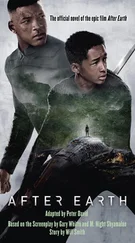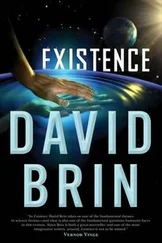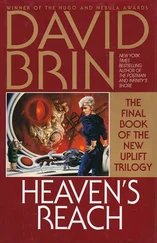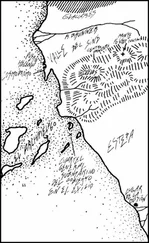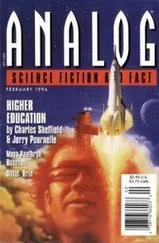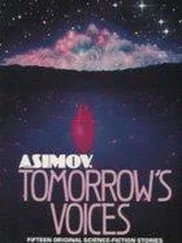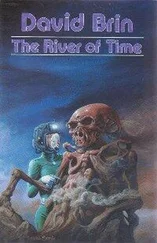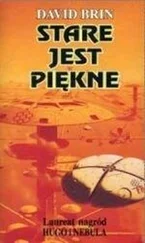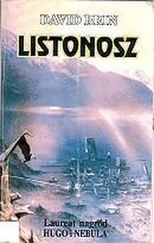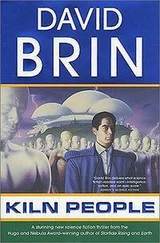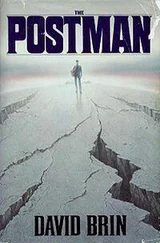Alex looked amused. “That’s not how it works, Stan. The singularity we made today was special. It grew too fast for our universe to contain it at all.
“We’re used to envisioning a black hole, even a micro, as something like a funnel in the fabric of space. But in this case, that fabric rebounded, folded over, sealed the breach. The hole is just gone , Stan.”
Stan felt tired and a little tipsy, but damn if he’d let this young hotshot get the better of him. “I know that! All causality links with our universe have been severed. There’s no connection with the thing anymore.
“But still I wonder. Where did it go?
There was a momentary silence.
“That’s probably the wrong question, Stan. A better way of putting it would be, What has the singularity become !”
The young genius now had that look in his eyes again — the philosophical one. “What do you mean?” Stan asked.
“I mean that the hole and all the mass we poured into it now ‘exists’ in its own pocket universe. That universe will never share any overlap or contact with our own. It will be a cosmos unto itself… now and forever.”
The statement seemed to carry a ring of finality, and there seemed to be little to say after that. For a while, the two of them just sat quietly.
After Alex went off to bed Stan stayed behind and played with his friends, the numbers. He rested very still and used a mental pencil to write them across the window. Equations stitched the Milky Way. It didn’t take long to see that Alex was right.
What they had done today was create something out of nothing and then quickly exile that something away again. To Alex and the others, that was that. All ledgers balanced. What had been borrowed was repaid. At least as far as this universe of matter and energy was concerned.
But something was different, dammit! Before, there had been virtual fluctuations in the vacuum. Now, somewhere , a tiny cosmos had been born.
And suddenly Stan remembered something else. Something called “inflation.” And in this context the term had nothing to do with economics.
Some theorists hold that our own universe began as a very, very big fluctuation in the primordial emptiness. That during one intense instant, superdense mass and energy burst forth to begin the expansion of all expansions.
Only there could not have been anywhere near enough mass to account for what we now see… all the stars and galaxies.
“Inflation” stood for a mathematical hat trick… a way for a medium or even small-sized bang to leverage itself into a great big one. Stan scribbled more equations on his mental blackboard and came to see something he hadn’t realized before.
Of course. I get it now. The inflation that took place twenty billion years ago was no coincidence. Rather, it was a natural result of that earlier, lesser creation. Our universe must have had its own start in a tiny, compressed ball of matter no heavier than… no heavier than…
Stan felt his heartbeat as the figure seemed to glow before him.
No heavier than that little “pocket cosmos” we created today.
He breathed.
That meant that somewhere, completely out of touch or contact, their innocent experiment might have… must have… initiated a beginning. A universal beginning.
Fiat lux.
Let there be light.
“Oh my God,” he said to himself, completely unsure which of a thousand ways he meant it.
I have a reputation for passing around my work a lot as I rewrite a novel and then rewrite it again. Seeking reality (or plausibility) checks was particularly important for this book. So, although I claim all errors and inconsistencies as my own, there are many people to thank for their help in making this a better novel better than it might have been.
For readability and general criticism, my appreciation goes out to Dr. Cheryl Brigham, Amy Thomsen, George Alec Effinger, Dr. Charles Sheffield, Dr. Gregory Benford, Jonathan Post, Dean Ing, Christie McCue Harmon, Dan Brin, Steven Mendel, Michael Cas-sutt, John Ensign, Janice Gelb, Celeste Satter, Betty Hull, Diane Clark, Elizabeth Oakes, Shiela Finch, Greg and Astrid Bear, Daryl Mallett, Barbara Neale, Rachel Neumieir, Robert Jolissaint, Jane Starr, managing editor Diane Shanley, designer Barbara Aronica, and my exceptional copy-editor, Len Neufeld.
For their special advice on countless technical details, I’d like to thank especially Professor John Cramer, Dr. Jim Moore, Karen Anderson, Dr. Gary Strathearn, Dr. Martyn Fogg, Dr. Steven Gil-lett, Joseph Carroll, Carole Sussman, and Dr. David Paige.
The Caltech literary and SF club, SPECTRE, was particularly helpful in circulating and discussing an early manuscript, with special thanks to Mark Adler, Ben Finley, Ken McCue, Steinn Sigurd-ssen, Ulrika Anderson, Amy Carpenter, David Palme, David Coufal, Paul Haubert, James Cummings, Douglass Bloomer, Erik Russell, Earl Hubbell, Yair Zadik, Eric Johnson, Gorm Nykeim, Eric Christian, Richard Achterberg, Matt Fields, Erich Schneider, Douglas Bloemer, and Dick Brown. In similar fashion, the ENIGMA Club, at UCLA, was most helpful, especially Scott Martin, Phil Adler, Robert Hurt, Pat Mannion, Wayne Bell, Andy Ashcroft, and
Tamara Boyd. The fine listeners of the New Zealand SF Society were most helpful in getting some of the Kiwi stuff right.
For their great patience, the editorial staff at Bantam Spectra Books have my admiration, especially Lou Aronica, for gritting his teeth and waiting, knowing I’d outgrow my declared intention to make this novel “gonzo.” For helping make it worth my while to devote so much time to one book, I want to thank my agent, Ralph Vicinanza.
To Cheryl and Dan, my deep gratitude simply for keeping me sane while I finished this monster.
And of course, I’d be remiss not to include Sol and Gaea, who together kept me alive all this time. I particularly appreciate the air to breathe, the sunshine, and that good, clean water. Don’t know what I’d do without them. Thanks again.
Early portions of Earth were written on an ancient Apple II computer with 48K of memory — coal fired, steam powered, with a serial number only five digits long. It was finished using a really neat Macintosh II with four megabytes RAM, a forty-megabyte hard disk, laser printer, and WordPerfect software, supplemented by the wonderful program QuicKeys. In prior lives I used to chip these tomes in stone or write them on clay tablets. What a difference! And there are still some who insist there’s no such thing as progress.
Man on Earth , by Charles Sheffield (published by Sidgewick Jackson, U.K.) This coffee-table book contains startling and beautiful scenes of the planet as viewed from space. The text, by a well-regarded scientist and novelist, is informative and insightful.
Earth , by Anne H. Ehrlich and Paul R. Ehrlich. Not to be confused with this novel! The Ehrlichs’ non-fiction paean to a planet in trouble is moving and stimulating. (There are also many geology texts with the same title.)
“Managing Planet Earth.” This special 1989 edition of Scientific American describes the most recent work by scientists studying the Earth’s systems, and strategies toward a sustainable world. The publishers of Scientific American have a series of excellent special volumes on topics ranging from geology to ecology. Ask for their order list.
Oasis in Space , by Preston Cloud. This well-regarded recent book by a professor at the University of California surveys the history of the planet, from the origins of life all the way to the present crises.
Читать дальше

